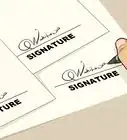This article was co-authored by Kathy Slattengren, M.Ed.. Kathy Slattengren is a Parent Educator and Coach and the Founder of Priceless Parenting. With over two decades of experience, Kathy specializes in helping parents build strong, loving relationships with their children. She has helped thousands of parents around the world through Priceless Parenting's online classes, presentations, coaching, and books. Kathy holds a Bachelor's degree in Computer Science and Psychology from The University of Minnesota and a Masters degree in Education and Instructional Design from The University of Washington. Kathy is a member of the National Parenting Education Network, the US Alliance to End the Hitting of Children, the International Society for Technology in Education, and a founding member of Parent Learning Link. Priceless Parenting has been featured on ABC News, Komo News, King 5 News, National PTA, Parent Map, and Inspire Me Today.
There are 10 references cited in this article, which can be found at the bottom of the page.
wikiHow marks an article as reader-approved once it receives enough positive feedback. In this case, several readers have written to tell us that this article was helpful to them, earning it our reader-approved status.
This article has been viewed 251,868 times.
The ability to write well is vitally important to your child's success in life. Writing well can help your child succeed academically and professionally.[1] Moreover, creative writing can be an important therapeutic outlet for your child to imagine new worlds and to express his or her feelings.[2] Help your child improve their creative writing skills by supporting creativity, by playing word games, and sparking their imagination with clever writing prompts.
Steps
Encouraging Your Child to Love Writing
-
1Read to your child every night. Reading and writing go hand-in-hand.[3] Good writers are well read in variety of subjects and writing styles. Your child's teacher and local librarian can help you select books that are appropriate to your child's age and interests.
- In addition to reading to your child, have your child read to you if they are old enough.
- Ask your child questions about their favorite books. Why do they like some books and not others? Help them to develop their tastes as a reader and to be thoughtful about words, characters, settings, and plots.[4]
- If your child has a favorite author or book series, you might also consider taking your child to see the author speak or to a book signing in order to inspire your child to write.
-
2Create time for reading and writing. Make sure your child's schedule isn't packed with other activities.[5] Reading and writing take a lot of time and mental energy, so you cannot expect your child to write a story in between soccer practice and piano lessons. Let your child explore the world of words during times when they can relax, breathe, contemplate, and think freely.[6]Advertisement
-
3Provide your child with a place and materials for creative writing. Just as children should have a quiet place to study and do their other homework, the same is true for their writing assignments. Ideally, this would be a desk in the child's room, away from the television. If your child wishes to have privacy, be sure that you afford that to them: do not read over their shoulder unless they say you can.[7] A child's writing area should include the following materials:[8]
- A notebook or journal
- Pens, pencils, and erasers
- A bookshelf to keep inspiration nearby
- An age-appropriate dictionary
- A thesaurus. A thesaurus isn't necessary for very young children, but it can be helpful for older children who wish to expand their vocabularies.
-
4Focus on creativity, not grammar. If your child is to succeed as a creative writer, they must learn how to experiment, take risks, and think outside the box. Don't discourage your child's creativity by harping on about spelling, grammar, or punctuation. Feel free to gently correct these mechanical errors, but do not make your child feel like they have failed a homework assignment.[9] Instead, praise creativity and talk to them about their ideas.[10]
-
5Show interest in your child's ideas. You might be your child's sole audience for their stories for quite a while. Encourage them to love creativity and writing by demonstrating your keen interest in their ideas, thoughts, and stories.[11] Ask them questions about their stories that show that you were paying attention.[12] Compliment your child when they have done something well, such as come up with an interesting character, write a funny plot, or use a difficult word correctly in a sentence.[13]
-
6Display your child's work. Children love it when their own drawings, stories, and paintings are displayed for the whole family to see. Keep your child motivated to write by putting their stories up on the fridge or placing them on a bulletin board.[14]
- You can also work with your child to make a special "book" out of their stories, including homemade illustrations and decorations. Stitch the book together with ribbon or yarn to create a special archive of their creativity.[15]
-
7Play stenographer. If your child is too young to write and spell out long stories, ask your child to come up with stories out loud. Write down your child's thoughts and read them back to your child.[16] You can do this with very young children to help them learn to connect spoken and written words or with older children to help them focus.
-
8Write and read along with your child. Be a model reader and writer for your child. Demonstrate to them that reading and writing are valuable and fun activities. The more your child sees you reading and writing, the more likely they will be to continue the practice on her own.[17]
-
9Correspond with friends and family often. Sometimes the most valuable writing activities are those that build and maintain important personal connections. Develop email or letter-writing correspondence with friends and family members and ask your child to assist you.[18] If your child is excited to receive and send letters, your child might apply this excitement to other writing activities.
Playing Creative Writing Games
-
1Incorporate writing activity into imaginative play. Your child likely already plays a number of fascinating, imaginative games. Perhaps they like to pretend that they are someone famous or enjoy playing "cops and robbers." Figure out a writing activity that fits into your child's interests and enthusiasms to spark their creative writing talents.[19] For example, you might:
- Encourage them to write a letter from the perspective of a character that they like to play
- Suggest that they write about "a day in the life" of their imaginary friend
- Help your child invent an imaginary country and ask them to write about what people do there
- Ask your child to create a "mashup" story that includes their favorite characters from completely different worlds[20]
-
2Play word games. There are a number of games and toys that can help build your child's vocabulary. These can all help your child develop a love of words and learn how to use different words appropriately.[21] Some popular word games and toys include:
- Scrabble
- Mad Libs
- Magnetic poetry
- Boggle
- Balderdash
- Catchphrase
- Taboo
-
3Play a collaborative story-writing game. If your child is shy or uncomfortable coming up with their own creative writing ideas, propose a game where the two of you can write a story together. Try to keep the story silly and light-hearted in order to keep your child interested and engaged. A few game ideas include:
- Write a story by switching after each sentence. First you write a sentence, then your child continues with the next sentence, then you take over again, etc. Try to add unexpected surprises and goofy twists to keep the story fun and exciting.[22]
- Draw a picture and ask your child to imagine a story behind the picture.[23]
- Make a list of words by having you and your child point to random words in a dictionary. Then brainstorm a way to use all of those words in a single story.
-
4Keep the games short. Depending on how old your child is, your child might have a limited attention span. Keep the games age-appropriate and brief in order to keep your child from becoming discouraged.[24] Limit these games to 15-30 minutes and allow your child to quit early if they seem bored, stressed out, or tired. Remember that these games must be fun in order to work.[25]
Helping Your Child Find Things to Write About
-
1Ask questions about the world around you. Develop your child's curiosity in order to develop their creative writing skills. Ask your child questions about the world around you in order to spark their curiosity and creativity.[26] Having interesting, thoughtful conversations in the home will help your child develop the curiosity and vocabulary necessary to becoming a creative writer.[27] For example, you might:
- Ask your child to look out a car window and think about where people on the sidewalk are headed
- Point out animals while you're walking and ask your child to think about what the lives of these animals are like
- Ask your child to come up with a new name for their favorite park
- Ask your child what their favorite building is and why they like it so much
-
2Ask your child to rewrite a famous story. Sometimes children might not be able to come up with completely unique characters, settings, and plots. In order to get them to practice writing creatively, consider having your child write a new version of an old classic, such as a fairy tale.[28] What would your child change about the story to make it his own?
-
3Have your child write a story around a random sentence. An effective writing prompt can be to pick a sentence out of your child's favorite book and asking them to write a story around that sentence.[29] See if your child can come up with a story that departs from the original source material to teach them how versatile creative writing can be.
-
4Have your child "read" wordless books. Wordless books can be an excellent way to have your child practice coming up with story ideas. These books have intricate, whimsical pictures that can allow your child to brainstorm an infinite number of new stories and ideas.[30] Check out or purchase a few wordless books and ask your child to figure out what the words might be.
Building Essential Writing Skills
-
1Encourage daily writing. The best way to improve writing skills, no matter the writer's age, is through regular practice. Your child might be getting a lot of good practice at school. However, if your child's school provides limited writing practice or if you're homeschooling your child, you may want to include additional formal writing lessons at home.[31] Even having your child write very straightforward things (such as what they did at school that day or what kinds of snacks they want to eat) can be excellent writing practice. It doesn't always have to be creative writing practice to be effective.
- Recognize, however, that sometimes children will be reluctant to write. Let them take some time away from writing if they need to (unless they have to complete a school assignment).[32]
-
2Encourage your child to keep a journal. A daily journal can be a terrific way for a young writer to expand their vocabulary, develop a unique writing style, and learn how to express complicated thoughts in words.[33] This builds essential skills and gives children an important outlet for sharing their thoughts and feelings.[34]
-
3Encourage your child to plan before writing difficult things. Sometimes the best writing practice is freewriting when your child simply writes whatever comes into their mind. However, if your child is a bit older and wants to write a longer or more ambitious story, encourage your child to make a writing plan first. Make sure your child has a sense of what they will write about, what the point of their story is, and (if relevant) what the assignment entails.[35] Do they have a plan for the beginning, middle, and end of the story?
-
4Resist the urge to do the writing yourself. Perfectionism can be harmful to your child's creativity and self-confidence. Rather than fixing your child's errors and mistakes, have your child reread their own writing and ask them what they think about it. Let them locate their own errors and encourage them to fix things themselves.[36] Never take over and rewrite their story yourself.[37]
- For example, you could underline the words they have misspelled without giving them the correct spelling. Ask them to look up the correct spelling in the dictionary.
- Be sure that you provide your child with positive feedback as well as gentle suggestions for improvements.
-
5Provide fun opportunities for revision. One of the most important skills your child will learn is how to revise first drafts into final drafts. Encourage your child to make changes to their story and to work hard at improving it. For example, you can ask them to use sticky notes to build off of the first draft of a story in order to add more details, clarify their language, and vary their sentence structures.[38] Let your child know that practice and perseverance are essential to the writing process.[39]
Expert Q&A
-
QuestionWhat can I do to encourage my child to get interested in writing in general?
 Kathy Slattengren, M.Ed.Kathy Slattengren is a Parent Educator and Coach and the Founder of Priceless Parenting. With over two decades of experience, Kathy specializes in helping parents build strong, loving relationships with their children. She has helped thousands of parents around the world through Priceless Parenting's online classes, presentations, coaching, and books. Kathy holds a Bachelor's degree in Computer Science and Psychology from The University of Minnesota and a Masters degree in Education and Instructional Design from The University of Washington. Kathy is a member of the National Parenting Education Network, the US Alliance to End the Hitting of Children, the International Society for Technology in Education, and a founding member of Parent Learning Link. Priceless Parenting has been featured on ABC News, Komo News, King 5 News, National PTA, Parent Map, and Inspire Me Today.
Kathy Slattengren, M.Ed.Kathy Slattengren is a Parent Educator and Coach and the Founder of Priceless Parenting. With over two decades of experience, Kathy specializes in helping parents build strong, loving relationships with their children. She has helped thousands of parents around the world through Priceless Parenting's online classes, presentations, coaching, and books. Kathy holds a Bachelor's degree in Computer Science and Psychology from The University of Minnesota and a Masters degree in Education and Instructional Design from The University of Washington. Kathy is a member of the National Parenting Education Network, the US Alliance to End the Hitting of Children, the International Society for Technology in Education, and a founding member of Parent Learning Link. Priceless Parenting has been featured on ABC News, Komo News, King 5 News, National PTA, Parent Map, and Inspire Me Today.
Parent Educator & Coach My biggest bit of advice would be to limit screen time. Something like writing requires a clear mind and some space to think. It's hard to get into that zone when you're always looking at a phone or computer screen.
My biggest bit of advice would be to limit screen time. Something like writing requires a clear mind and some space to think. It's hard to get into that zone when you're always looking at a phone or computer screen. -
QuestionHow can I make my child interested in writing a story?
 Community AnswerEncourage her to read more story books. Do not criticize her for writing anything impossible or imaginative. Give interesting and uncommon topics, such as: A night alone in jungle, floating in space, things you want to do but can't, etc.
Community AnswerEncourage her to read more story books. Do not criticize her for writing anything impossible or imaginative. Give interesting and uncommon topics, such as: A night alone in jungle, floating in space, things you want to do but can't, etc. -
QuestionHow can I encourage my daughter who is in grade 5 to improve her writing skills? She loves to read books, but is unable to organize her sentences and thoughts in a correct way.
 Community AnswerThink about the types of books she reads. Are they younger picture books or 300 page novels? Something more mature with better sentences and stronger pieces may help her learn and become more advanced. There are also tutors and peer counselors you could seek out to help her with that. Talk to someone at the school or even at your local library. Help her with understanding punctuation, especially commas and semi-colons, so she can learn to construct longer/compound sentences.
Community AnswerThink about the types of books she reads. Are they younger picture books or 300 page novels? Something more mature with better sentences and stronger pieces may help her learn and become more advanced. There are also tutors and peer counselors you could seek out to help her with that. Talk to someone at the school or even at your local library. Help her with understanding punctuation, especially commas and semi-colons, so she can learn to construct longer/compound sentences.
Warnings
- Don't force a particular form of writing on your child (short story, poetry, etc) if your child shows no interest in it. Encourage your child in the areas of writing they show an interest in.⧼thumbs_response⧽
- Some children show little interest in writing because they happen to enjoy other activities more. However, some children are nervous about writing because of an underlying learning disability. If your child is consistently behind her peers on spelling, writing, and vocabulary, talk to your child's teachers and learning specialists to see if perhaps a learning disability is at the root of these problems.⧼thumbs_response⧽
References
- ↑ http://www2.ed.gov/pubs/parents/Writing/index.html
- ↑ http://www2.ed.gov/pubs/parents/Writing/index.html
- ↑ http://www.readingrockets.org/article/launching-young-writers
- ↑ http://www.oxfordowl.co.uk/pages/encouraging-writing
- ↑ http://www.sylvanlearning.com/blog/index.php/5-ways-to-help-your-child-become-a-better-creative-writer/
- ↑ Kathy Slattengren, M.Ed.. Parent Educator & Coach. Expert Interview. 23 June 2021.
- ↑ http://www.oxfordowl.co.uk/pages/encouraging-writing
- ↑ http://www.ncte.org/positions/statements/howtohelpenglish
- ↑ http://www.greatschools.org/gk/articles/seven-ways-to-encourage-kids-writing/
- ↑ http://www.ncte.org/positions/statements/howtohelpenglish
- ↑ http://www.oxfordowl.co.uk/pages/encouraging-writing
- ↑ http://www.greatschools.org/gk/articles/seven-ways-to-encourage-kids-writing/
- ↑ http://www.greatschools.org/gk/articles/seven-ways-to-encourage-kids-writing/
- ↑ http://www.education.com/reference/article/ways-encourage-child-creativity/
- ↑ http://www.readingrockets.org/article/launching-young-writers
- ↑ http://www.scholastic.com/parents/resources/article/writing-activities/prompt-your-child-to-be-better-writer
- ↑ http://www.ncte.org/positions/statements/howtohelpenglish
- ↑ http://www.ncte.org/positions/statements/howtohelpenglish
- ↑ http://www.greatschools.org/gk/articles/seven-ways-to-encourage-kids-writing/
- ↑ http://www.oxfordowl.co.uk/pages/encouraging-writing
- ↑ http://www.greatschools.org/gk/articles/seven-ways-to-encourage-kids-writing/
- ↑ http://www.education.com/reference/article/ways-encourage-child-creativity/
- ↑ http://www.greatschools.org/gk/articles/seven-ways-to-encourage-kids-writing/
- ↑ http://www.greatschools.org/gk/articles/seven-ways-to-encourage-kids-writing/
- ↑ http://www.greatschools.org/gk/articles/seven-ways-to-encourage-kids-writing/
- ↑ http://www.education.com/reference/article/ways-encourage-child-creativity/
- ↑ http://www.ncte.org/positions/statements/howtohelpenglish
- ↑ http://www.education.com/reference/article/ways-encourage-child-creativity/
- ↑ http://www.oxfordowl.co.uk/pages/encouraging-writing
- ↑ http://www.scholastic.com/parents/resources/article/writing-activities/prompt-your-child-to-be-better-writer
- ↑ http://www.ncte.org/positions/statements/howtohelpenglish
- ↑ http://www.ncte.org/positions/statements/howtohelpenglish
- ↑ http://www.readingrockets.org/article/launching-young-writers
- ↑ http://www2.ed.gov/pubs/parents/Writing/index.html
- ↑ http://www.greatschools.org/gk/articles/your-teen-and-writing/
- ↑ http://www.education.com/reference/article/ways-encourage-child-creativity/
- ↑ http://www.readingrockets.org/article/launching-young-writers
- ↑ http://www.scholastic.com/parents/resources/article/writing-activities/prompt-your-child-to-be-better-writer
- ↑ http://www.readingrockets.org/article/launching-young-writers
- ↑ http://www.ncte.org/positions/statements/howtohelpenglish
About This Article
The ability to write well can help your child academically and professionally as well as offer an outlet for their feelings and imagination. To help improve your child’s creative writing skills, encourage them to love writing by reading to them every day so they can experience a variety of styles and subjects. Ask them about their favorite books to help them think about what kinds of writing they enjoy. You'll also want to give your child the tools to create their own stories, like a journal, pens, an age-appropriate dictionary, and a thesaurus. Encourage your child’s creativity by focusing on their ideas, not their spelling, grammar, or handwriting. If your child has a hard time starting a story, spark their imagination by asking them to write a letter from the point of view of a favorite character, or help them invent a new country and ask them to write about what people do there. To learn how to help your child revise their writing, keep reading!

























-Step-11-Version-3.webp)






















-Step-11-Version-3.webp)


































